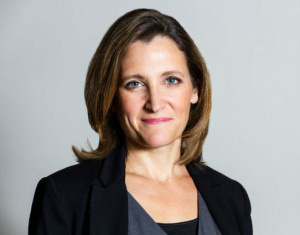OTTAWA, (Reuters) – Canada will impose targeted sanctions against 40 Venezuelan senior officials, including President Nicolás Maduro, to punish them for “anti-democratic behavior,” the foreign ministry said yesterday.
Canada’s move, which followed a similar decision by the United States, came after months of protests against Maduro’s government in which at least 125 people have been killed. Critics say he has plunged the nation into its worst-ever economic crisis and brought it to the brink of dictatorship.

“Canada will not stand by silently as the government of Venezuela robs its people of their fundamental democratic rights,” Foreign Minister Chrystia Freeland said in a statement.
The measures include freezing the assets of the officials and banning Canadians from having any dealings with them.
The actions were “in response to the government of Venezuela’s deepening descent into dictatorship,” Canada said.
There was no immediate reaction from Caracas, where the government established a pro-Maduro legislative superbody that has overruled the country’s opposition-led Congress.
Maduro has said he faces an armed insurrection designed to end socialism in Latin America and let a U.S.-backed business elite get its hands on the OPEC nation’s crude reserves.
The United States imposed sanctions on Maduro in late July and has also targeted around 30 other officials.
The Canadian measures name Maduro, Vice President Tareck El Aissami and 38 other people, including the ministers of defense and the interior as well as several Supreme Court judges.
Canada is a member of the 12-nation Lima Group, which is trying to address the Venezuelan crisis. A government official said Freeland wanted to host a meeting of the group within the next 60 days.
Cyndee Todgham Cherniak, a trade sanctions expert at Toronto law firm LexSage, said although limited in scope, the Canadian measures were symbolic.
“When you join other countries … it makes the message louder,” she said by phone.
Canadian Prime Minister Justin Trudeau said on Thursday he believed there was a chance for a political solution.
“This is a situation that is obviously untenable. The violence … needs to end and we are looking to be helpful,” he told reporters at the United Nations.
Experts say individual measures have had little or no impact on Maduro’s policies and that broader oil-sector and financial sanctions may be the only way to make the Venezuelan government feel economic pain.
U.S. President Donald Trump last month signed an executive order that prohibits dealings in new debt from the Venezuelan government or its state oil company.
Earlier this month, Spain said it wanted the European Union to adopt restrictive measures against members of the Venezuelan government.










